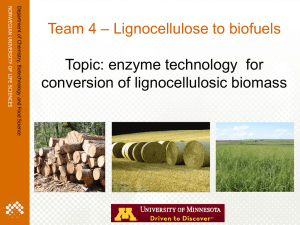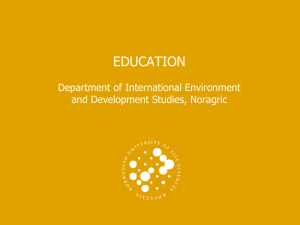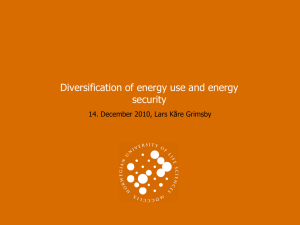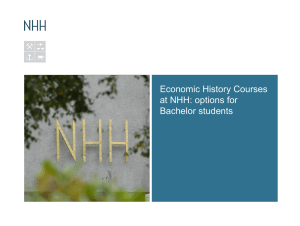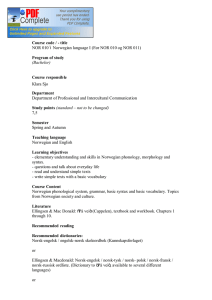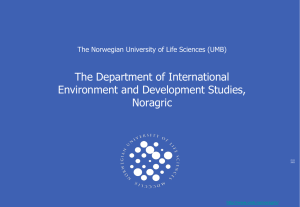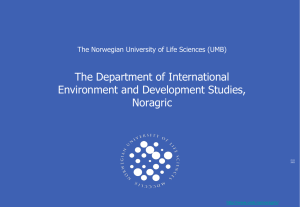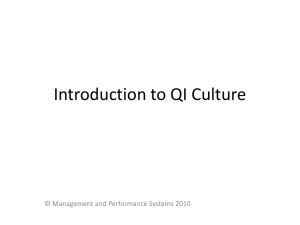FEM TIPS FØR DU BRUKER MALEN!
advertisement
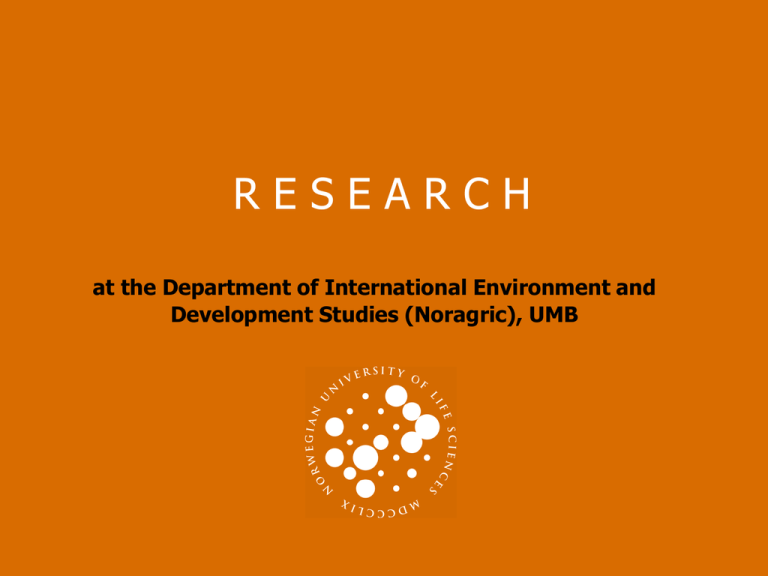
RESEARCH at the Department of International Environment and Development Studies (Noragric), UMB Dept of International Environment and Development Studies, Noragric NORWEGIAN UNIVERSITY OF LIFE SCIENCES Noragric Permanent scientific staff: 23/24 Post.Doc. fellows: 5 PhD candidates at present: approx. 40 From: Africa 14, Asia 3, Norway 17, Europe - other countries 3, America 3 Research is organised in 4 Research Clusters Number of scientific publications/year: 78 (2012) www.umb.no Research at Noragric 2012 NORWEGIAN UNIVERSITY OF LIFE SCIENCES Noragric’s Research Profile at UMB Strong international orientation in both research and education programmes Working with and aiming to further develop: interdisciplinary approaches to global and cross-cutting challenges in environment and development A special responsibility for social sciences (except economics located at Handelshøyskolen) at UMB Managing UMB’ competence agreement with NORAD Responsible for coordination of institutional collaboration for a large number of agreements with institutions in countries in the Global South and in Eastern Europe www.umb.no 3 Dept of International Environment and Development Studies, Noragric NORWEGIAN UNIVERSITY OF LIFE SCIENCES Research Clusters at Noragric Environmental Governance (ENGOV) Conflict, Human Security & Development (CHSD) Climate Change, Agriculture and Development (CC-AD) Rights and Power in Development (RAPID) The clusters are organised as thematic research groups, and therefore have partly overlapping memberships. All PhD candidates are members of at least one cluster. www.umb.no Dept of International Environment and Development Studies, Noragric NORWEGIAN UNIVERSITY OF LIFE SCIENCES Environmental Governance (ENGOV) Cluster Leader: Pål Vedeld Staff involved: Staff: 18, PhD candidates: 15 (approx.) Research areas: Global conventions & governance levels, and links to regional, trans-boundary, and national and local levels Governance structures, policy formulation and implementation Protection as a distinct policy measure and instrument Power and elite captures of local resources Decentralization and participation Knowledge and power Rights-based and participatory development Institutions; attitudes, values and norms Poverty, livelihoods, resource dependence and conflicts www.umb.no Dept of International Environment and Development Studies, Noragric NORWEGIAN UNIVERSITY OF LIFE SCIENCES Conflict, Human Security & Development (CHSD) Cluster Leader: Ingrid Nyborg Staff involved: Scientific staff: 11, PhD candidates: 10 (approx.) Research areas: Human security in conflict/post conflict, war/post war situations Conflict/post conflict institution building Human security and human rights Health and conflict Livelihood security and revival in conflict and post-conflict contexts; resettlement and reintegration Resource conflicts, negotiations and human security Seed systems and security in conflict/post-conflict and post-disaster situations www.umb.no Dept of International Environment and Development Studies, Noragric NORWEGIAN UNIVERSITY OF LIFE SCIENCES Climate Change, Agriculture and Development (CC-AD) Cluster Leader: Jens Aune Staff involved: Scientific staff: 8, PhD candidates: 8 (approx.) Research areas: Adaptation and mitigation of climate change in rural areas Livelihood security of rural households Improved farming methods Management of agricultural biodiversity Agricultural policies and trade Environmental impacts of agricultural production www.umb.no Dept of International Environment and Development Studies, Noragric NORWEGIAN UNIVERSITY OF LIFE SCIENCES Rights and Power in Development (RAPID) Cluster Leader: John Andrew McNeish Staff involved: Scientific staff 18; PhD candidates: 9 (approx.) Research areas: Formalisation of land and resource rights Equal rights vs. asymmetric power relationships in developing countries Competing claims to resources under different development models Normative principles in development processes Political and legal accountabilities in relation to human rights and democratic participation Knowledge, power and accountability in development processes www.umb.no Dept of International Environment and Development Studies, Noragric NORWEGIAN UNIVERSITY OF LIFE SCIENCES Networks Resources, Risk and Governance – Net (RRG-Net) Critical Mass – a forum to build research capacity to address climate change, poverty and development challenges www.umb.no Dept of International Environment and Development Studies, Noragric NORWEGIAN UNIVERSITY OF LIFE SCIENCES Resources, Risk and Governance – Net (RRG-Net) Network Leader: Gufu Oba Research areas: Resources: The potential for adaptation; Different natural systems’ resilience and variability and the goals of the users. Risk: Bridging the gaps between resource adaptations and social demands in the face of external & internal drivers of risks. How different natural systems exposed to comparable environmental variability respond to systems management. Governance: Socio-political perspectives of management, drivers of policy, formal and informal systems. Governance and risk reduction in management of natural systems with reference to risks such as those caused by insecurity of tenure. www.umb.no Dept of International Environment and Development Studies, Noragric NORWEGIAN UNIVERSITY OF LIFE SCIENCES Critical Mass – a forum to build research capacity to address climate change, poverty and development challenges Network leader: Siri Eriksen The 'Critical Mass – is a Norwegian forum of researchers and practitioners engaged in building research and capacity to address climate change, poverty and development challenges. The name reflects two key objectives: • First, to forge dialogue and synergies between practitioners and researchers spread across diverse institutions in order to create a critical mass of experts confronting climate change, poverty and development challenges. • Second, to address as a group the need to think critically about the problem of climate change by identifying key emerging understanding, perspectives, questions and knowledge gaps. www.umb.no Dept of International Environment and Development Studies, Noragric NORWEGIAN UNIVERSITY OF LIFE SCIENCES Results: PhD Defences Since start of PhD programme (1996) 35 PhD candidates graduated. In 2012: David M. Tumusiime Protected areas and people in Uganda: Costs, benefits, livelihoods and narratives around Bwindi Impenetrable National Park Bridget B. Umar From maize mono-cropping to conservation agriculture : A multi-perspective analysis of smallholder conservation agriculture in southern, central and eastern Zambia Nani Raut Agricultural intensification processes and greenhouse gas emissions from soils: a study from Nepal and India Progress Nyanga Conservation agriculture among smallholder farmers in Zambia: Attitudes and socio-economic impacts www.umb.no Dept of International Environment and Development Studies, Noragric NORWEGIAN UNIVERSITY OF LIFE SCIENCES Results: PhD Defences 2013 – by July Hege Wallevik The complexity of generalisation: A phenomenological approach to economic affairs among women in Zanzibar Town Kishor Atreya Pesticide use in Nepal: Health effects and economic costs for farmers in the Central mid-hills Frode Sundnes Claiming Land, Nature and History: Land Restitution and Nature Conservation at the Dukuduku Forest, South Africa. Kashif Saeed Khan Conflict, livelihoods and local perspectives of peace building in post-9/11 north-western Pakistan. Sunetro Ghosal Intimate beasts: Exploring relationships between humans and large carnivores in western India. www.umb.no Research at Noragric 2012 NORWEGIAN UNIVERSITY OF LIFE SCIENCES Results: Noragric Publications 2012 Number of (peer reviewed) publications: 78 Including one book, 56 journal articles, and 21 book chapters Publication points total: 56,2 (in Norwegian Current Research Information System) Publication points per scientific staff: 1,34 • UMB’s target is 1 pp per scientific staff www.umb.no 14 Dept of International Environment and Development Studies, Noragric NORWEGIAN UNIVERSITY OF LIFE SCIENCES Noragric’s Research and Knowledge Dissemination in other publication and information channels 60 52 50 43 3436 40 2728 30 20 10 0 3 4 11 7 7 7 0 0 5 1615 6 2009 20 3 1 0 www.umb.no 2008 8 13 15 6 7 10 2010 2011
